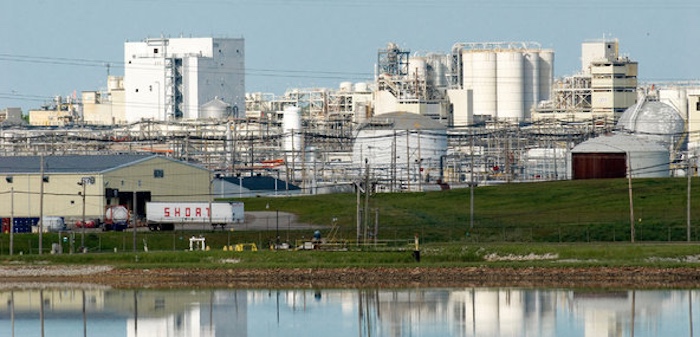ImpactAlpha, May 21 – Massive flooding in Midland, Michigan on Wednesday threatened to release chemicals from a Dow chemical complex, where products ranging from Saran Wrap to Agent Orange have been produced over years, and an adjacent Superfund site. It’s the kind of nightmare scenario that imperils public health as well as corporate value, and one that investor groups have been sounding the alarm on as global warming increases the frequency of severe weather events.
“This should be a warning sign,” says Lila Holzman of As You Sow.
The group filed a resolution last year asking Dow (then DowDuPont) to report public health risks of “expanding their petrochemical operations in areas increasingly prone to climate change-induced storms, flooding, and sea level rise.”
The vote didn’t garner much support, but the unfolding crisis could elevate the issue at Chevron and Exxon, which face similar votes at their annual shareholder meetings next week. More than half of shareholders voted in favor of flood-risk reporting at Phillips 66 in early May.
Chemical risk
During Hurricane Harvey, oil refineries and chemical plants released roughly two million pounds of hazardous pollutants. Almost 40 new petrochemical projects are now underway, most in the flood-prone Gulf region, according to The Environmental Integrity Project, as oil and gas companies look to petrochemicals to prop up demand for oil and gas.
Exxon alone is spending $20 billion on chemical and other expansion projects as part of its ‘Growing the Gulf’ initiative.
Fossil fuel funding
As You Sow chalked up a symbolic win on Tuesday when half of JPMorgan Chase shareholders supported its resolution asking the bank, the world’s biggest fossil fuel financier, to disclose how it will reduce the climate impact of its lending. Former Exxon chief and longtime Chase director Lee Raymond was re-elected to the bank’s board despite a concerted investor effort to oust him.
BlackRock in the hot seat
At its general meeting today, shareholders will weigh in on some high-profile proposals. One, filed by As You Sow, asks BlackRock to detail how it plans to implement the Business Roundtable’s new statement of corporate purpose, which prioritizes a company’s employees, customers, suppliers and communities alongside their shareholders.
Another asks the $7 trillion asset manager to explain its climate-related proxy voting record. Despite public pronouncements by BlackRock’s Larry Fink about climate risk, the company backed just 6 of 52 such resolutions last year, according to the Interfaith Center on Corporate Responsibility, which filed the proposal.











